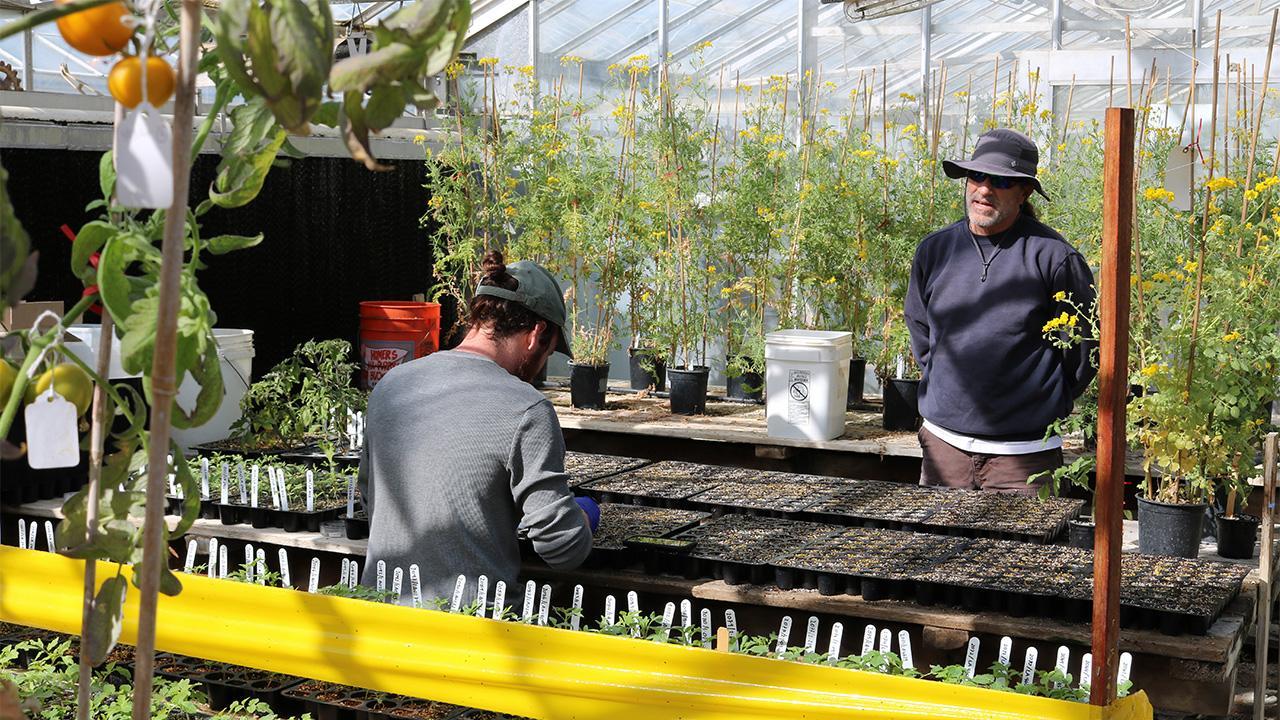
Chancell-ing: Basic Research Powers Breakthroughs for a Healthier World
While we’re enjoying the last days of summer, many signs of fall are already here: the UC Davis campus buzzing with staff and faculty preparing for the fall quarter, downtown merchants ready to welcome students from every corner of the world and trucks carrying Yolo County’s world-class produce to grocery stores across the country.
Those trucks — especially those overflowing with tomatoes — tell a story about UC Davis research and our commitment to improving lives. They illustrate how basic, exploratory research leads to solutions for intractable problems and how research at California’s public universities serves the public good.
A century ago, when Yolo County and the Central Valley became the heart of canned-tomato production in the United States, producers faced a challenge: the mechanical harvesters destroyed as many tomatoes as they picked.
That’s when two scientists at UC Davis developed a solution. Combining generations of basic research on tomato genetics with decades of applied mechanical engineering research, they produced a hardier new tomato strain and a machine to harvest them.
Today, almost every tomato grown in the United States for sauce, paste, ketchup or juice is harvested by one of these machines — and most are grown right here in California.
Innovative research like this, often rooted in decades-old inquiry, continues to improve every aspect of our lives, from the kitchen table to the doctor’s office.
As I discussed in April, our national commitment to funding research at public universities is under threat like never before. Since World War II, this compact between government, universities and the business community has powered individual economic opportunity, American global competitiveness and technological innovation.
It’s a complicated national discussion with profound local implications. I am determined to engage with our community about the vital role of America’s research universities to our nation and UC Davis’s role in our community.
Basic research is a critical component of that work. It’s the pursuit of knowledge without a specific application in mind. Unlike applied research, which aims to solve a particular challenge, basic research is a more open-ended exploration and discovery.
I like to think of basic research as a conversation. Researchers around the world engage in an ongoing dialogue with each other. They publish findings that challenge old assumptions, unlock new understandings and raise new questions. It’s competitive, as every researcher hopes their work leads to a significant breakthrough, but basic research is an engine of global collaboration that brings us all closer to innovations that transform lives.
Critics of basic research call the work wasteful, suggesting it’s a luxury we can’t afford in a time of tight national budgets. However, this seemingly undirected exploration leads to unpredictable breakthroughs that create new industries and solve problems we didn't even know we had.
That conversation pays off enormous dividends. At UC Davis, it serves our mission of bringing the power of this research to the people of our state and region.
UC Davis researchers improve patients' lives by transforming basic research principles into real-world treatments. A team of neuroscientists recently developed a communication tool for ALS patients who’ve lost the power of speech, relying on pioneering brain-computer interface research that began at UCLA in the 1970s to restore their voices.
Another team of researchers in our College of Engineering is building on that same basic research to increase the autonomy of paralyzed patients by allowing them to control computer cursors without assistance. This will expand their freedom and improve the quality of their lives.
The COVID-19 pandemic was another moment when foundational research transitioned into lifesaving applied work. Faced with an immediate need to improve indoor air quality to prevent disease transmission in homes, classrooms and offices, researchers at UC Davis applied basic research from addressing outdoor air pollution to building smart systems to increase ventilation and air quality indoors.
The path from basic research to tangible outcomes extends to the health of our global community. In October, our researchers will share their ongoing work on the Future of Food. They will explore the connection between basic research into genetics, soil, and climate and solutions to feed the world.
We see the results here in Yolo County, where UC Davis researchers released new varieties of strawberries resistant to Fusarium wilt, a soilborne disease that threatens strawberry production. Those varieties help protect production here in California, where almost 90% of the nation’s strawberries are grown. They are descendants of lines developed through foundational research nearly a century ago in the 1930s.
UC Davis researchers are improving nutrition worldwide. One team is fortifying bouillon cubes in West Africa, which has the potential to save more than 50,000 lives in Nigeria this decade alone.
Researchers in the department of plant sciences just applied for a patent for a strain of wheat that can produce its own fertilizer, reducing pollution and costs for producers. The work, which relies on basic research into CRISPR gene editing developed at UC Berkeley a decade ago, could save American farmers billions of dollars every year and reduce hunger worldwide.
These breakthroughs are just a small sample of the work happening across UC Davis labs and fields, but they all trace back to basic research. Supporting basic research at universities like ours ensures that we keep saving lives, feeding the world and strengthening our communities.
Without continued investment today, we jeopardize the critical discoveries that will improve lives tomorrow.